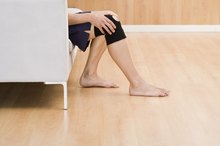Which Vitamins Are Good for Muscle Pains?
Your body uses vitamins and minerals to carry out its normal functions and maintain its health, including that of the bones and muscles. Some vitamin deficiencies can result in muscle pain, so you may want to supplement your diet if you suspect your chronic muscle pains are partially or primarily caused by a vitamin deficiency. Of course, any serious muscle problems should be treated by a qualified doctor.
Vitamin B-1
Vitamin B-1, also known as thiamin, is used by your body in a variety of ways, including for the synthesis of DNA and RNA in cells. According to the Linus Pauling Institute, a deficiency in thiamin can cause nerve damage, resulting in muscle pain and weakness. If you are suffering from muscle pain, you may not be consuming enough B-1 normally or you may have had a sudden increase in your B-1 intake due to a demanding exercise regime, pregnancy, or breastfeeding. You can find B-1 in whole grain foods, legumes and pork.
- Vitamin B-1, also known as thiamin, is used by your body in a variety of ways, including for the synthesis of DNA and RNA in cells.
- According to the Linus Pauling Institute, a deficiency in thiamin can cause nerve damage, resulting in muscle pain and weakness.
Vitamin D
Nutritional Cause of Stiff Leg Muscles
Learn More
Your body uses vitamin D to maintain strong bones by absorbing calcium and helping your muscles move. A vitamin D deficiency can cause osteomalacia in adults, leading to muscle pain and weakness. However, it is easy to make sure you are getting enough vitamin D. According to the National Institutes of Health, your body can produce the vitamin D it needs through just a few minutes of daily exposure to direct sunlight. You can also supplement your intake with a multivitamin.
- Your body uses vitamin D to maintain strong bones by absorbing calcium and helping your muscles move.
- However, it is easy to make sure you are getting enough vitamin D. According to the National Institutes of Health, your body can produce the vitamin D it needs through just a few minutes of daily exposure to direct sunlight.
Vitamin E
Vitamin E is an antioxidant which fights damage to cells caused by harmful substances called free radicals. However, insufficient amounts of vitamin E can cause muscle damage, leading to muscle weakness and loss of movement control, along with a weakened immune system. Vitamin E can be found naturally in nuts and seeds, sunflower oil, wheat germ, and fortified cereals. Most multivitamins also provide sufficient amounts of vitamin E to meet the needs of an average adult.
- Vitamin E is an antioxidant which fights damage to cells caused by harmful substances called free radicals.
- However, insufficient amounts of vitamin E can cause muscle damage, leading to muscle weakness and loss of movement control, along with a weakened immune system.
Other Vitamins and Minerals
Can Certain Vitamins Help Tight Muscles?
Learn More
Other nutrients can also help relieve muscle pains. A magnesium deficiency can cause muscle weakness and pain, while a lack of other B vitamins, like riboflavin, can also lead to muscle cramps and pain. However, some vitamins and minerals, like vitamin E, can cause toxicity when consumed too much, so make sure you consult your doctor before using any vitamin supplements to treat muscle pain.
Related Articles
References
- Office of Dietary Supplements; Dietary Supplement Fact Sheet: Vitamin D
- Office of Dietary Supplements; Dietary Supplement Fact Sheet: Vitamin E
- MedlinePlus; Magnesium in Diet; Linda Vorvick, MD
- American Cancer Society; Vitamin B Complex
- U.S. National Library of Medicine. MedlinePlus. Vitamins. Reviewed February 2, 2019.
- U.S. National Library of Medicine. MedlinePlus. Vitamin D Deficiency.
- U.S. National Library of Medicine. MedlinePlus. Vitamin B12 deficiency anemia. Reviewed January 19, 2018.
- U.S. National Library of Medicine. MedlinePlus. Pellagra. Reviewed October 12, 2018.
- National Institute of Neurological Disorders and Stroke. Restless Legs Syndrome Fact Sheet.
- Vici G, Belli L, Biondi M, Polzonetti V. Gluten free diet and nutrient deficiencies: A review. Clin Nutr. 2016;35(6):1236-1241. doi:10.1016/j.clnu.2016.05.002
- Wacker M, Holick MF. Sunlight and Vitamin D: A global perspective for health. Dermatoendocrinol. 2013;5(1):51-108. doi:10.4161/derm.24494
- Crohn’s & Colitis Foundation. Vitamin and Mineral Supplementation.
- Foundation for Peripheral Neuropathy. Vitamin B12 Deficiency Neuropathy.
- U.S. National Library of Medicine. MedlinePlus. Vitamin B Test. Updated May 28, 2019.
- International Foundation for Gastrointestinal Disorder. Malabsorption.
- Diab L, Krebs NF.Vitamin Excess and Deficiency.Pediatr Rev. 2018 Apr;39(4):161-179. doi: 10.1542/pir.2016-0068.
- Thomas-Valdés S, Tostes MDGV, Anunciação PC, da Silva BP, Sant'Ana HMP.Association between vitamin deficiency and metabolic disorders related to obesity.Crit Rev Food Sci Nutr. 2017 Oct 13;57(15):3332-3343. doi: 10.1080/10408398.2015.1117413.
Writer Bio
Joseph McAllister has worked as a writer since 2003. He has more than seven years of experience in training and coaching martial arts. McAllister writes for various websites on a variety of topics including martial arts, competition and fitness. He graduated from Liberty University on a full ride National Merit Scholarship with a Bachelor of Science in print journalism.









